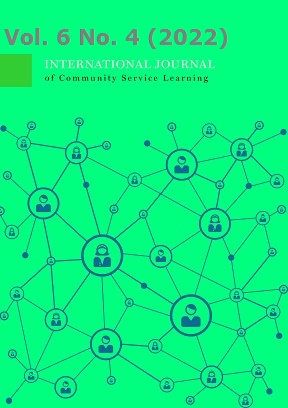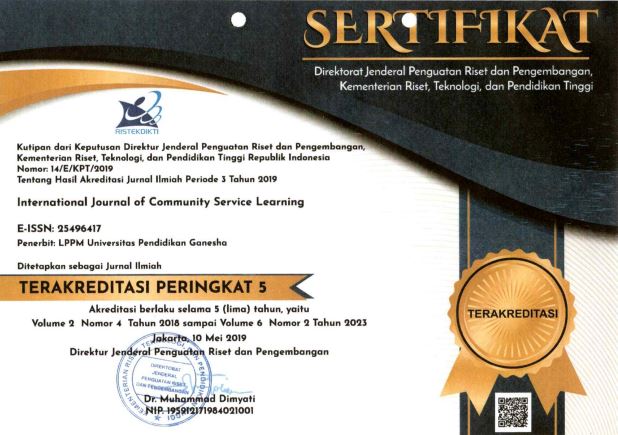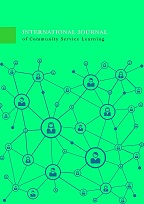Application of TPACK in 21st Century Learning
DOI:
https://doi.org/10.23887/ijcsl.v6i4.54620Keywords:
21st Century, 4C, TPACKAbstract
Pembelajaran pada abad 21 tentunya tidak lepas dari perkembangan yang terjadi pada zamannya dan teknologi bukan lagi menjadi kebutuhan sekunder dalam kehidupan, melainkan kebutuhan primer yang harus dipenuhi salah satunya adalah dunia pendidikan. Tujuan yang ingin dicapai melalui kegiatan pengabdian masyarakat ini adalah memberikan wawasan pembelajaran dan keterampilan berbasis Technological Pedagogical Content Knowledge (TPACK) bagi guru-guru sekolah dasar di Gugus Wahidin Sudiro Husodo Kabupaten Jumapolo. Pengabdian kepada masyarakat ini dilaksanakan dengan metode yang terdiri dari persiapan (koordinasi, pembuatan instrumen, penyusunan lansam, publikasi, lokasi, dokumentasi), pelaksanaan kegiatan (pembukaan, penyajian materi, diskusi, praktik, dan tanya jawab, penutup), dan pemantauan. Kegiatan pengabdian masyarakat ini dilaksanakan pada hari Selasa, 17 Mei 2022 di ruang SD Gugus Wahidin Sudiro Husodo Kecamatan Jumapolo dengan pola waktu pelaksanaan 6 jam yaitu dimulai pukul 08.30 WIB sampai dengan 14.35 WIB. Kegiatan pengabdian ini menyasar seluruh guru Sekolah Gugus Wahidin Sudiro Husodo Kabupaten Jumapolo. Dari hasil sesi tanya jawab dan praktik, diketahui bahwa secara umum para peserta cukup baik dalam memahami dan mengembangkan kemampuan pedagogik di bidang teknologi. Peserta juga memahami dan setuju bahwa pembelajaran berbasis Technological Pedagogical Content Knowledge (TPACK) dan 21st century skills sangat menarik untuk diterapkan. Pelayanan ini berjalan dengan lancar dan efisien serta para peserta sangat antusias menyambut pelayanan ini.
References
Absari, N., Priyanto, P., & Muslikhin, M. (2020). The effectiveness of Technology, Pedagogy and Content Knowledge (TPACK) in learning. Jurnal Pendidikan Teknologi Dan Kejuruan, 26(1), 43–51. https://doi.org/10.21831/jptk.v26i1.24012. DOI: https://doi.org/10.21831/jptk.v26i1.24012
Aesaert, K., Vanderlinde, R., Tondeur, J., & van Braak, J. (2013). The content of educational technology curricula: a cross-curricular state of the art. Educational Technology Research and Development, 61(1), 131–151. https://doi.org/10.1007/s11423-012-9279-9. DOI: https://doi.org/10.1007/s11423-012-9279-9
Ali Al-Mutawah, M., Alghazo, Y. M., Mahmoud, E. Y., Preji, N., & Thomas, R. (2021). Designing a need-based integrated steam framework for primary schools in Bahrain. International Journal of Education and Practice, 9(3), 602–612. https://doi.org/10.18488/journal.61.2021.93.602.612. DOI: https://doi.org/10.18488/journal.61.2021.93.602.612
Bedir, H. (2019). Pre-service ELT teachers’ beliefs and perceptions on 21st century learning and innovation skills (4Cs). Journal of Language and Linguistic Studies, 15(1), 231–246. https://doi.org/10.17263/jlls.547718. DOI: https://doi.org/10.17263/jlls.547718
Dewi, C. A., & Mashami, R. A. (2019). The Effect of Chemo-Entrepreneurship Oriented Inquiry Module on Improving Students’ Creative Thinking Ability. Journal of Turkish Science Education, 16(2), 253–263. http://files.eric.ed.gov/fulltext/EJ1264963.pdf.
Dewi, D. R. (2019). Pengembangan kurikulum di Indonesia dalam menghadapi tuntutan abad ke-21. As-Salam: Jurnal Studi Hukum Islam & Pendidikan, 8(1), 1–22. https://doi.org/10.51226/assalam.v8i1.123. DOI: https://doi.org/10.51226/assalam.v8i1.123
Dewi, N. K., Safruddin, S., Rosyidah, A. N. K., & Sari, M. P. (2022). Pelatihan Penyusunan Rencana Pelaksanaan Pembelajaran Berbasis Steam Pada Mahasiswa Pgsd Fkip Unram. Jurnal Pendidikan Dan Pengabdian Masyarakat, 5(4), 406–410. https://doi.org/10.29303/jppm.v5i4.4307.
Durriyah, T. L., & Zuhdi, M. (2018). Digital Literacy With EFL Student Teachers: Exploring Indonesian Student Teachers’ Initial Perception About Integrating Digital Technologies Into a Teaching Unit. International Journal of Education and Literacy Studies, 6(3), 53–60. https://doi.org/10.7575/aiac.ijels.v.6n.3p.53. DOI: https://doi.org/10.7575/aiac.ijels.v.6n.3p.53
Elassy, N. (2015). The concepts of quality, quality assurance and quality enhancement. Jurnal Administrasi Pendidikan, 23(3), 250–261. https://doi.org/10.1108/QAE-11-2012-0046. DOI: https://doi.org/10.1108/QAE-11-2012-0046
Falloon, G. (2020). From digital literacy to digital competence: the teacher digital competency (TDC) framework. Educational Technology Research and Development, 68(5), 2449–2472. https://doi.org/10.1007/s11423-020-09767-4. DOI: https://doi.org/10.1007/s11423-020-09767-4
Fernández-Santín, M., & Feliu-Torruella, M. (2020). Developing critical thinking in early childhood through the philosophy of Reggio Emilia. Thinking Skills and Creativity, 37, 100686. https://doi.org/10.1016/j.tsc.2020.100686. DOI: https://doi.org/10.1016/j.tsc.2020.100686
Ferreira, M. M., & Trudel, A. R. (2012). The impact of problem-based learning (PBL) on student attitudes toward science, problem-solving skills, and sense of community in the classroom. Journal of Classroom Interaction, 47(1), 23–30. https://www.jstor.org/stable/43858871.
Gretter, S., & Yadav, A. (2016). Computational thinking and media & information literacy: An integrated approach to teaching twenty-first century skills. TechTrends, 60(5), 510–516. https://doi.org/10.1007/s11528-016-0098-4. DOI: https://doi.org/10.1007/s11528-016-0098-4
Guggemos, J., & Seufert, S. (2021). Teaching with and teaching about technology – Evidence for professional development of in-service teachers. Computers in Human Behavior, 115(May 2020), 106613. https://doi.org/10.1016/j.chb.2020.106613. DOI: https://doi.org/10.1016/j.chb.2020.106613
Hamdu, G., Fuadi, F. N., Yulianto, A., & Akhirani, Y. S. (2020). Items quality analysis using rasch model to measure elementary school students’ critical thinking skill on stem learning. JPI (Jurnal Pendidikan Indonesia), 9(1), 61–74. https://doi.org/10.23887/jpi-undiksha.v9i1.20884. DOI: https://doi.org/10.23887/jpi-undiksha.v9i1.20884
Handini, O., & Soekirno, S. (2019). Intensitas Pembelajaran Tematik Integratif Melalui Pendekatan Saintifik Di SD Kestalan Surakarta. Widya Wacana: Jurnal Ilmiah, 14(1). https://doi.org/10.33061/ww.v14i1.2760. DOI: https://doi.org/10.33061/ww.v14i1.2760
Jang, H. (2016). Identifying 21st century STEM competencies using workplace data. Journal of Science Education and Technology, 25(2), 284–301. https://doi.org/10.1007/s10956-015-9593-1. DOI: https://doi.org/10.1007/s10956-015-9593-1
Juwandani, E., Aliyah, A. S. N., Melati, C. S., & Susanto, R. (2022). Blended Learning Strategy in the New Normal Era (TPACK Competency Study). Pedagonal: Jurnal Ilmiah Pendidikan, 6(2), 169–179. https://doi.org/10.55215/pedagonal.v6i2.5611. DOI: https://doi.org/10.55215/pedagonal.v6i2.5611
Kereluik, K., Mishra, P., Fahnoe, C., & Terry, L. (2013). What knowledge is of most worth: Teacher knowledge for 21st century learning. Journal of Digital Learning in Teacher Education, 29(4), 127–140. https://doi.org/10.1080/21532974.2013.10784716. DOI: https://doi.org/10.1080/21532974.2013.10784716
Koh, J. H. L., Chai, C. S., Benjamin, W., & Hong, H. Y. (2015). Technological pedagogical content knowledge (TPACK) and design thinking: A framework to support ICT lesson design for 21st century learning. The Asia-Pacific Education Researcher, 24(3), 535–543. https://doi.org/10.1007/s40299-015-0237-2. DOI: https://doi.org/10.1007/s40299-015-0237-2
Koh, J. H. L., Chai, C. S., & Lim, W. Y. (2017). Teacher professional development for TPACK-21CL: Effects on teacher ICT integration and student outcomes. Journal of Educational Computing Research, 55(2), 172–196. https://doi.org/10.1177/0735633116656848. DOI: https://doi.org/10.1177/0735633116656848
Kuswanto, E. (2014). Peranan Guru PAI dalam Pendidikan Akhlak di Sekolah. Mudarrisa: Jurnal Kajian Pendidikan Islam, 6(2), 194–220. https://doi.org/10.18326/mdr.v6i2.194-220. DOI: https://doi.org/10.18326/mdr.v6i2.764
Liu, Z. K., He, J., & Li, B. (2015). Critical and creative thinking as learning processes at top-ranking Chinese middle schools: possibilities and required improvements. High Ability Studies, 26(1), 139–152. https://doi.org/10.1080/13598139.2015.1015501. DOI: https://doi.org/10.1080/13598139.2015.1015501
Malik, R. S. (2018). Educational challenges in 21st century and sustainable development. Journal of Sustainable Development Education and Research, 2(1), 9–20. https://doi.org/10.17509/jsder.v2i1.12266. DOI: https://doi.org/10.17509/jsder.v2i1.12266
Nuryati, N., & Darsinah, D. (2021). Implementasi Teori Perkembangan Kognitif Jean Piaget dalam Pembelajaran Matematika di Sekolah Dasar. Jurnal Papeda: Jurnal Publikasi Pendidikan Dasar, 3(2), 153–162. https://doi.org/10.36232/jurnalpendidikandasar.v3i2.1186. DOI: https://doi.org/10.36232/jurnalpendidikandasar.v3i2.1186
Pratiwi, S. N., Cari, C., & Aminah, N. S. (2019). Pembelajaran IPA abad 21 dengan literasi sains siswa. Jurnal Materi Dan Pembelajaran Fisika, 9(1), 34–42. https://doi.org/10.20961/jmpf.v9i1.31612.
Quddus, A. (2020). Implementasi Technological Pedagogical Content Knowledge (TPACK) dalam Pendidikan Profesi Guru (PPG) PAI LPTK UIN Mataram. Jurnal Tatsqif, 17(2), 213–230. https://doi.org/10.20414/jtq.v17i2.1911. DOI: https://doi.org/10.20414/jtq.v17i2.1911
Rahmatika, A. (2022). The Effect of Think-Talk-Write Cooperative Learning Assisted by GeoGebra Software on Students’ Critical Thinking (Case Study of SMA AL-HIDAYAH Medan). IJEMS: Indonesian Journal of Education and Mathematical Science, 3(1), 1–8. https://doi.org/10.30596%2Fijems.v3i1.9877. DOI: https://doi.org/10.30596/ijems.v3i1.9877
Sailer, M., Stadler, M., Schultz-Pernice, F., Franke, U., Schöffmann, C., Paniotova, V., Husagic, L., & Fischer, F. (2021). Technology-related teaching skills and attitudes: Validation of a scenario-based self-assessment instrument for teachers. Computers in Human Behavior, 115, 106625. https://doi.org/10.1016/j.chb.2020.106625. DOI: https://doi.org/10.1016/j.chb.2020.106625
Santos, J. M., & Castro, R. D. (2021). Technological Pedagogical content knowledge (TPACK) in action: Application of learning in the classroom by pre-service teachers (PST). Social Sciences & Humanities Open, 3(1), 100110. https://doi.org/10.1016/j.ssaho.2021.100110. DOI: https://doi.org/10.1016/j.ssaho.2021.100110
Schmid, M., Brianza, E., & Petko, D. (2021). Self-reported technological pedagogical content knowledge (TPACK) of pre-service teachers in relation to digital technology use in lesson plans. Computers in Human Behavior, 115, 106586. https://doi.org/10.1016/j.chb.2020.106586. DOI: https://doi.org/10.1016/j.chb.2020.106586
Septikasari, R., & Frasandy, R. N. (2018). Keterampilan 4C abad 21 dalam pembelajaran pendidikan dasar. Tarbiyah Al-Awlad: Jurnal Kependidikan Islam Tingkat Dasar, 8(2), 107–117. https://doi.org/10.15548/alawlad.v8i2.1597.
Seufert, S., Guggemos, J., & Sailer, M. (2021). Technology-related knowledge, skills, and attitudes of pre- and in-service teachers: The current situation and emerging trends. Computers in Human Behavior, 115(September 2020), 106552. https://doi.org/10.1016/j.chb.2020.106552. DOI: https://doi.org/10.1016/j.chb.2020.106552
Suchyadi, Y., Safitri, N., & Sunardi, O. (2020). The Use Of Multimedia As An Effort To Improve Elementary Teacher Education Study Program College Students’comprehension Ability And Creative Thinking Skills In Following Science Study Courses. JHSS (Journal of Humanities and Social Studies), 4(2), 201–205. https://doi.org/10.33751/jhss.v4i2.2549. DOI: https://doi.org/10.33751/jhss.v4i2.2549
Sumarni, W., & Kadarwati, S. (2020). Ethno-stem project-based learning: Its impact to critical and creative thinking skills. Jurnal Pendidikan IPA Indonesia, 9(1), 11–21. https://doi.org/10.15294/jpii.v9i1.21754. DOI: https://doi.org/10.15294/jpii.v9i1.21754
Sumiati, S., & Ahmad, A. (2021). Pengendalian Mutu Pendidikan: Konsep Dan Aplikasi. IQRA: Jurnal Magister Pendidikan Islam, 1(1), 43–50. https://journal.unismuh.ac.id/index.php/iqra/article/view/5806/3735.
Suprapto, N., Sukarmin, S., Puspitawati, R. P., Erman, E., Savitri, D., Ku, C. H., & Mubarok, H. (2021). Research trend on TPACK through bibliometric analysis (2015-2019). International Journal of Evaluation and Research in Education, 10(4), 1375–1385. https://doi.org/10.11591/IJERE.V10I4.22062. DOI: https://doi.org/10.11591/ijere.v10i4.22062
Suwarto, M. P. (2022). Pendagogik Ilmu Pengetahuan Alam. Penerbit Lakeisha.
Tan, S. C., Chan, C., Bielaczyc, K., Ma, L., Scardamalia, M., & Bereiter, C. (2021). Knowledge building: aligning education with needs for knowledge creation in the digital age. Educational Technology Research and Development, 69(4), 2243–2266. https://doi.org/10.1007/s11423-020-09914-x. DOI: https://doi.org/10.1007/s11423-020-09914-x
Voogt, J., & Roblin, N. P. (2012). A comparative analysis of international frameworks for 21st century competences: Implications for national curriculum policies. Journal of Curriculum Studies, 44(3), 299–321. https://doi.org/10.1080/00220272.2012.668938. DOI: https://doi.org/10.1080/00220272.2012.668938
Voogt, Joke, & McKenney, S. (2017). TPACK in teacher education: are we preparing teachers to use technology for early literacy? Technology, Pedagogy and Education, 26(1), 69–83. https://doi.org/10.1080/1475939X.2016.1174730. DOI: https://doi.org/10.1080/1475939X.2016.1174730
Wardani, N. (2018). Penerapan Strategi Pembelajaran Tematik Untuk Meningkatkan Kreativitas Dan Hasil Belajar Siswa Kelas I SDN 02 Pangongangan Kota Madiun. Jurnal Edukasi Gemilang (JEG), 3(1), 83–90. https://ejurnalkotamadiun.org/index.php/JEG/article/view/86.
Westbroek, H., De Vries, B., Walraven, A., Handelzalts, A., & McKenney, S. (2019). Teachers as co-designers: Scientific and colloquial evidence on teacher professional development and curriculum innovation. In Collaborative Curriculum Design for Sustainable Innovation and Teacher Learning. https://doi.org/10.1007/978-3-030-20062-6_3. DOI: https://doi.org/10.1007/978-3-030-20062-6_3
Wiguna, C. S. (2016). Pengaruh Model Pembelajaran Poe Terhadap Pemahaman Konsep Dan Kemampuan Berpikir Kreatif Peserta Didik. Jurnal Geografi Gea, 13(1), 134–139. https://doi.org/10.17509/gea.v13i1.3306. DOI: https://doi.org/10.17509/gea.v13i1.3306
Downloads
Published
How to Cite
Issue
Section
License
Copyright (c) 2022 International Journal of Community Service Learning

This work is licensed under a Creative Commons Attribution-ShareAlike 4.0 International License.

International Journal of Comunnity Service Learning is licensed under a Creative Commons Attribution-ShareAlike 4.0 International License.













